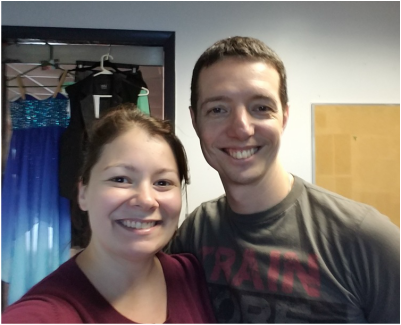 Selfie with Ilya!
Selfie with Ilya!
Recently I was lucky enough to work with Ilya Rezin (Rhythm champion and judge!). I had never worked with him before, and I was excited for my session with him, especially after watching him win with numerous students at past competitions I’ve attended. After a challenging, but invigorating, hour-and-a-half session, he was kind enough to sit down with me and answer some questions around competing.
Leading up to a competition, what advice do you have for people to prepare whether it’s mentally or what to focus on?
“Just do rounds. Rounds and rounds and rounds and rounds, because most of the time the problem at the competition is that with the increase of stress you lose stamina. Once you lose stamina, you can’t keep going. There are a few problems. Number one is floor craft. People are not used to it, so you need to train floor craft. If you don’t have a crowded floor when you do rounds, you can put 20 balloons on it and turn the fan on, and then avoid the balloons. That’s problem number one, so you can train to that. Number two is stamina. You need to do rounds and rounds and rounds. The week before I wouldn’t suggest changing anything. I would just suggest running through your choreography. Make sure it’s in your muscle memory, and make sure you can do it whether you’re tired, early, late, regardless. If you don’t like to be in front of people, then make sure you invite people to watch you do rounds.”
What do you look for when you’re judging?
“I’m a technician, so for me the most important thing is your ability to fill up the music. You’re dancing to the music, so you should be able to dance to the music not with the music or next to it. I will look at your ability to use the legs to transform it and your ability to bind yourself within the two counts. You should show exactly how much it takes you to get from one foot to another, rather than just doing the foot action and walking through it. I look at musicality; then I look at footwork and your ability to go off the standing leg versus just slapping the feet around. The third thing I will look at is your isolation and body movement. If you’re a female, I will look at how your back is moving, because for me, it’s a clear indicator whether you know how to use your sides or not. If the back stays flat while you’re dancing, then that tells me you’re not really sure how to use your center.”
With regards to what you should wear at a competition, in your opinion, what do the best students in this country look like?
“Well they look like pros.”
And what does that include?
“It should include your hair style, your makeup, your tanning, your shoes, and your dress. It’s a visual sport, so you get judged by the way you look more than by the way you dance. You can dance like a pro, but if you’re going to look like a beginner then you’re not going to get marked or you’re not going to be able to present everything as a package. It’s a package deal, so the way you look is just as important as the way you move. I think that the best way for the beginner dancer to place well is to wear an expensive dress, because the point of the dress is to hide all the imperfection and reinforce your assets. You want to show off more of your assets and hide your liabilities. That’s the point of a dress that’s done well. If you don’t move somewhere (on your body), then a little fringe here, a little fringe there, and oh my gosh you’re moving. I think you need to invest. I think it’s just as important as investing in lessons.”
So there you have it! Some expert advice from one of the top rhythm dancers, and excellent insight into what judges look for in students. Tune back in for my advice on how to look professional without breaking the bank and for a different perspective on judging from the one and only Johnathan Roberts! Until then, happy competing and happy dancing!
Leading up to a competition, what advice do you have for people to prepare whether it’s mentally or what to focus on?
“Just do rounds. Rounds and rounds and rounds and rounds, because most of the time the problem at the competition is that with the increase of stress you lose stamina. Once you lose stamina, you can’t keep going. There are a few problems. Number one is floor craft. People are not used to it, so you need to train floor craft. If you don’t have a crowded floor when you do rounds, you can put 20 balloons on it and turn the fan on, and then avoid the balloons. That’s problem number one, so you can train to that. Number two is stamina. You need to do rounds and rounds and rounds. The week before I wouldn’t suggest changing anything. I would just suggest running through your choreography. Make sure it’s in your muscle memory, and make sure you can do it whether you’re tired, early, late, regardless. If you don’t like to be in front of people, then make sure you invite people to watch you do rounds.”
What do you look for when you’re judging?
“I’m a technician, so for me the most important thing is your ability to fill up the music. You’re dancing to the music, so you should be able to dance to the music not with the music or next to it. I will look at your ability to use the legs to transform it and your ability to bind yourself within the two counts. You should show exactly how much it takes you to get from one foot to another, rather than just doing the foot action and walking through it. I look at musicality; then I look at footwork and your ability to go off the standing leg versus just slapping the feet around. The third thing I will look at is your isolation and body movement. If you’re a female, I will look at how your back is moving, because for me, it’s a clear indicator whether you know how to use your sides or not. If the back stays flat while you’re dancing, then that tells me you’re not really sure how to use your center.”
With regards to what you should wear at a competition, in your opinion, what do the best students in this country look like?
“Well they look like pros.”
And what does that include?
“It should include your hair style, your makeup, your tanning, your shoes, and your dress. It’s a visual sport, so you get judged by the way you look more than by the way you dance. You can dance like a pro, but if you’re going to look like a beginner then you’re not going to get marked or you’re not going to be able to present everything as a package. It’s a package deal, so the way you look is just as important as the way you move. I think that the best way for the beginner dancer to place well is to wear an expensive dress, because the point of the dress is to hide all the imperfection and reinforce your assets. You want to show off more of your assets and hide your liabilities. That’s the point of a dress that’s done well. If you don’t move somewhere (on your body), then a little fringe here, a little fringe there, and oh my gosh you’re moving. I think you need to invest. I think it’s just as important as investing in lessons.”
So there you have it! Some expert advice from one of the top rhythm dancers, and excellent insight into what judges look for in students. Tune back in for my advice on how to look professional without breaking the bank and for a different perspective on judging from the one and only Johnathan Roberts! Until then, happy competing and happy dancing!



 RSS Feed
RSS Feed